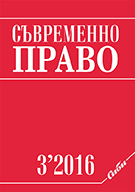„Невъзможното“ информирано съгласие при лечението на деца, чиито родители са малолетни или непълнолетни
The ‘Impossible’ Informed Consent for Medical Treatment of Children Whose Parents Are Minors
Author(s): Momchil Mavrov, Maria Sharkova, Ekaterina UchikovaSubject(s): Law, Constitution, Jurisprudence, Constitutional Law
Published by: Софийски университет »Св. Климент Охридски«
Keywords: informed consent; medical treatment of a child; rights of the child patient; emancipation; special representative; mediation; hospital ombudsman
Summary/Abstract: The authors examine the legal, medical and ethical aspects related to giving birth by minors and, in particular, the problems which arise in providing medical assistance to the children and giving informed consent for their medical treatment. The article analyzes the possible solutions to the problem in accordance with the relevant legislation acts, such as the Healthcare Act, the Child Protection Act, the Persons and Family Act and the Family Code, and identifies the weaknesses of the existing legislation and its inconsistency with the Convention on the Rights of the Child. Consideration is given to the thesis according to which the parent gets emancipated upon the child’s birth and can, therefore, give consent for the child’s medical treatment. The argument is based on the text of Art. 87, paras 2 and 4 of the Healthcare Act, which uses the term ‘parent’ without specifying whether the latter is of full age. Another thesis to which attention is drawn is that, on the grounds of Art. 3 of the Persons and Family Act, those minor parents who are not emancipated within the meaning of Art. 6, para. 4 of the Family Code should give consent for the medical treatment of their child jointly with a parent of theirs, as each person of full age has the right to give informed consent for the medical treatment of his/her grandchild in case the parents of the latter are minors. The authors point out the shortcomings of the two currently existing solutions and make de lege ferenda proposals, which are consistent with the Convention on the Rights of the Child and the Protocols thereto, as well as with good practices and examples from other countries.
Journal: Съвременно право
- Issue Year: 2016
- Issue No: 3
- Page Range: 79-90
- Page Count: 12
- Language: Bulgarian
- Content File-PDF

